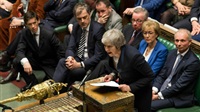Michael Gove refuses to confirm Brexit bill vote will go ahead

Michael Gove has refused to confirm Theresa May will
bring forward her withdrawal bill as planned in the first week of June after
MPs from across the political spectrum rejected her 10-point “new deal”.
The environment secretary, who supports May’s deal,
said it was a time to “reflect” and consider the options, raising the prospect
that the prime minister would have to pull the vote.
In a last-ditch effort to win support, the prime
minister offered parliamentary votes on a second referendum and temporary
customs union but Labour said it would not vote for the bill and at least 25
Conservative MPs also withdrew their support. The DUP also remains opposed.
Asked whether the bill would be brought forward in
early June, Gove told BBC Radio 4’s Today programme: “We will reflect over the
course of the next few days on how people look at the proposition that is being
put forward … Rather than saying anything precipitate everyone should take an
opportunity to reflect and take a look at the bill that is being published
later today.”
Pressed on the prime minister’s future, he said: “I
think the most important thing we should do is reflect on all the options in
front of us … it is always right there is a period of reflection and analysis.”
Gove said May had his “respect and support” but
could not say how long she would remain prime minister.
May will defend her proposal in the Commons on
Wednesday where the reaction is likely to be very hostile from her own side.
Nigel Evans, a member of the 1922 Committee
executive, said the prime minister should recognise it was “game over” and he
would press once again for rule changes to allow another vote of no confidence.
Jacob Rees-Mogg, the leader of the Eurosceptic
European Research Group of Tory MPs, said he hoped the prime minister would
look at the lack of support for her bill and “recognise that in truth the prime
minister does not command the confidence of the House of Commons”.
May had sought to woo remainers by promising that if
MPs supported the deal at its second reading in early June, she would offer
them a vote on a referendum as the legislation passes through parliament – and
be bound by the result.
“I do not believe this is a route that we should
take, because I think we should be implementing the result of the first
referendum, not asking the British people to vote in a second one,’ she said.
“But I recognise the genuine and sincere strength of feeling across the house
on this important issue.”
MPs would also be given the opportunity to vote on
alternative customs proposals, including the compromise offer May made to
Labour during the ill-fated six-week negotiations of a temporary customs union
on goods. If Labour won the next general election, it could upgrade it to a
permanent arrangement.
May made a series of other pledges, including a
separate bill to ensure workers’ rights do not fall behind those in the EU, a
guarantee that there will be “no change in the level of environmental
protection when we leave the EU”, and a promise that parliament will be
consulted on the next stage of Brexit negotiations.
But MPs across the House of Commons were not
persuaded by May’s new proposals. By Tuesday evening, not a single MP who
opposed the deal last time had come out to support it.
The Labour leader, Jeremy Corbyn, said: “We won’t
back a repackaged version of the same old deal – and it’s clear that this weak
and disintegrating government is unable deliver on its own commitments.”









